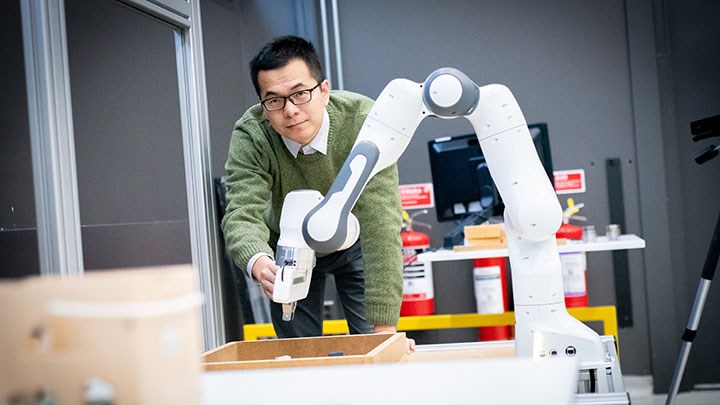“Robots will be capable of training each other”

With his thesis “Robot Skill Acquisition through Prior-Conditioned Reinforcement Learning”, Quantao Yang is the first doctoral student from Örebro University within WASP, the Wallenberg AI, Autonomous Systems and Software Program.
Robots could be capable of handling more complex tasks than they do today. Robots could also learn from one another, making the entire manufacturing industry more efficient. This is according to Quantao Yang’s doctoral thesis, recently defended at Örebro University.
Robot Skill Acquisition through Prior-Conditioned Reinforcement Learning, Quantao Yang, Örebro University, Science and Technology, 2023.
Like newborns learning things for the first time – grasping blocks, crawling, walking, and talking – a robot also starts from null.
“In most cases, robots learn everything from scratch. And especially in the manufacturing industry, where they’re strictly programmed to handle a specific task. Robots often have difficulty learning new things,” explains Quantao Yang, and continues, “They just follow their exact steps. If you add a new task, the robot cannot do it.”
A few years ago, when Quantao Yang was working as a robotics engineer, it struck him how difficult it was to get a robot to handle different types of more complex tasks.
“I wanted to investigate whether it would be possible for the robot to handle more than one task,” he says.
That is basically what Quantao Yang’s thesis is about – how robots can solve new tasks using artificial intelligence to benefit from what they have already learned. In addition, through artificial intelligence, one robot can benefit from another robot’s knowledge and handle completely new tasks more efficiently.
“What surprised me most was that the robot could actually acquire new skills by utilising previous experience – and learn from another robot.”
Improving manufacturing efficiency
Quantao Yang concludes that time-consuming and manual programming can be reduced.
“Robots will learn to solve new tasks, just like humans do. In this way, robots will adapt to different environments and unexpected changes. Simply put, they’ll be more flexible. In turn, they’ll make the manufacturing industry much more efficient.”
Will robots develop solutions and learn new skills independently, which we humans have not considered?
“Yes, in some way, I believe they’ll be capable of doing this. But it’s complex and one of the major global challenges for industry today.”
First within WASP
With his thesis “Robot Skill Acquisition through Prior-Conditioned Reinforcement Learning”, Quantao Yang is the first doctoral student from Örebro University within WASP, the Wallenberg AI, Autonomous Systems and Software Program. WASP is Sweden’s leading individual research program, a major national initiative for strategically motivated basic research, doctoral programmes, and faculty recruitment.
Text and photo: Maria Widar
Translation: Jerry Gray
